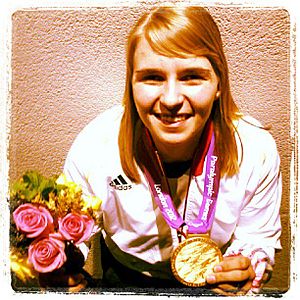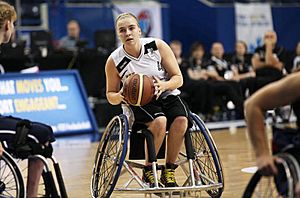Mareike Miller facts for kids

Mareike (Adermann) Miller with the gold medal after winning the women's wheelchair basketball competition at the London Paralympic Games 2012.
|
||||||||||||||||||||||||||
| Personal information | ||||||||||||||||||||||||||
|---|---|---|---|---|---|---|---|---|---|---|---|---|---|---|---|---|---|---|---|---|---|---|---|---|---|---|
| Nationality | ||||||||||||||||||||||||||
| Born | 3 August 1990 | |||||||||||||||||||||||||
| Website | facebook.com/mareikemiller | |||||||||||||||||||||||||
| Sport | ||||||||||||||||||||||||||
| Country | Germany | |||||||||||||||||||||||||
| Sport | Wheelchair basketball | |||||||||||||||||||||||||
| Disability class | 4.5 | |||||||||||||||||||||||||
| Event(s) | Wheelchair Basketball | |||||||||||||||||||||||||
| College team | University of Wisconsin-Whitewater | |||||||||||||||||||||||||
| Team | Doneck Dolphins Trier | |||||||||||||||||||||||||
| Coached by | Dirk Passiwan | |||||||||||||||||||||||||
| Achievements and titles | ||||||||||||||||||||||||||
| Paralympic finals | 2012 Paralympics, 2016 Paralympics | |||||||||||||||||||||||||
|
Medal record
|
||||||||||||||||||||||||||
Mareike Miller (born August 3, 1990) is a talented German wheelchair basketball player. She is known for her skills as a 4.5 point player, which means she has a minimal disability but plays in a wheelchair. Mareike has achieved great success with the German national team. She has won two European titles and earned silver medals at the World Championships in 2010 and 2014. Her biggest achievements include a gold medal at the 2012 Summer Paralympics in London and a silver medal at the 2016 Rio Paralympics. For these amazing wins, the German team received the Silbernes Lorbeerblatt (Silver Laurel Leaf), which is Germany's highest sports honor.
Contents
Mareike Miller's Early Life and Journey
Mareike Miller was born on August 3, 1990. Her parents are Karl-Heinz and Kristin, and she has a brother named Nils. People sometimes call her "MA."
Discovering Wheelchair Basketball
Mareike started playing regular basketball when she was seven years old. At 14, she joined a senior club team in Germany. During her very first game, she suffered a serious knee injury. Over the next four years, she had four knee surgeries. Each time, it took her eight months to recover. Sadly, she would injure her knee again just weeks after returning to play.
By the age of 18, Mareike had to stop playing regular basketball. It was a tough decision, but her physical education teacher suggested she try wheelchair basketball. Mareike had never heard of it before! Even though she plays in a wheelchair for the sport, she doesn't need one for her daily life. She is classified as a 4.5 point player, meaning she has a very small disability.
Being able to move her body fully gives the 180 centimetres (71 in) tall center player an advantage. However, she learned that shooting from a wheelchair requires a lot of strength. It's like shooting from the three-point line while standing up!
One of the greatest pleasures of life is doing the things that others say you can not do.
—Mareike Miller
Joining the National Team
When Mareike started wheelchair basketball in 2008, she didn't plan to join the national team. But she worked incredibly hard, practicing every day. In just one year, she made it onto the national team! That same year, she began playing for ASV Bonn in a German league.
In 2009, Mareike moved to the United States to study business at the University of Wisconsin-Whitewater. She found that the training there was much more intense than in Germany. In Germany, clubs usually trained two or three times a week. But in the U.S., training was daily, and the weight rooms were open all the time. During her summer breaks in Germany, she continued to train with other teams to stay in shape.
In 2011, Mareike became the captain of the German Under 25 (U25) National team. They competed in their first-ever World Championships that year.
Competing at the Paralympics
Winning Gold in London 2012
In March 2012, Mareike's UWW Warhawks team won the US Intercollegiate National Championships. She scored 17 points and had 13 rebounds in the final game! Later that year, Mareike prepared for the 2012 Summer Paralympics in London. She attended training camps in Australia, the Netherlands, and North Carolina.
In the gold medal match in London, Germany played against Australia. Australia had beaten them just a few months earlier. The game was held in front of over 12,000 fans! The German team had been undefeated in the tournament, but sometimes started slowly. Mareike scored 19 points in the final, more than any other player. She was a key reason Germany won 58–44.
Mareike said that her shots weren't "crazy" or from far away. She just had more chances to shoot because Australia didn't guard her as closely as other players. She felt they underestimated her, which worked out well for her team.
This was Germany's first gold medal in women's wheelchair basketball at the Paralympics since 1984. In November 2012, President Joachim Gauck gave the team the Silver Laurel Leaf. They were also named German Team of the Year for 2012. Mareike later wrote that some people told her she had achieved everything she could, but she disagreed.
Silver Medals and Continued Success
After a tough loss in the European Championship final in 2013, the German team bounced back. They won a silver medal at the 2014 Women's World Wheelchair Basketball Championship in Toronto, Canada.
In 2015, Mareike had more knee surgeries and couldn't play with the German team. But she returned strong for the 2016 Paralympic Games in Rio de Janeiro. The team won another silver medal after losing to the United States in the final.
After the 2016 Paralympics, many players and the head coach of the German national team retired. Mareike stayed on as one of the experienced players. She now plays for Martin Otto, the same physical education teacher who first encouraged her to try wheelchair basketball! As one of the team captains, she helped lead her team to another European Championship silver medal in 2017. This showed that the team could still play at a high level, even with many changes.
In 2018, Mareike captained the team at the World Championships in Hamburg, Germany. She lives in Hamburg and plays for the professional team BG Baskets Hamburg.
Mareike also competed in women's wheelchair basketball at the 2024 Summer Paralympics in Paris, France. Germany finished in 6th place overall.
Mareike Miller's Achievements
- 2009: Gold at the European Championships
- 2009: Silver at German Women's National Championships
- 2010: Silver at the Women's World Championships
- 2010: Bronze at the U22 mixed European Championships
- 2010: Gold at German Women's National Championships
- 2011: Silver at German Women's National Championships
- 2011: Gold at the European Championships (Nazareth, Israel)
- 2012: Intercollegiate Champion
- 2012: Silver at German Women's National Championships
- 2012: Gold at the Paralympic Games (London, England)
- 2013: Intercollegiate Champion
- 2013: Silver European Championships (Frankfurt, Germany)
- 2014: Intercollegiate Champion
- 2014: Silver at the World Championships (Toronto, Canada)
- 2016: Silver at the Paralympic Games (Rio de Janeiro, Brazil)
- 2017: Silver European Championships
- 2018: Bronze at the World Championships (Hamburg, Germany)
- 2019: Silver European Championships
- 2021: 4th Place and German Flagbearer at the Paralympic Games (Tokyo, Japan)
- 2023: 4th Place World Championships
- 2023: 4th Place European Championships
- 2024: 6th Place at the Paralympic Games (Paris, France)
Awards and Recognition
- 2011, 2012, 2014, 2016: Team of the Year
- 2012 and 2014: Silver Laurel Leaf
Images for kids
See also
 In Spanish: Mareike Adermann para niños
In Spanish: Mareike Adermann para niños
 | May Edward Chinn |
 | Rebecca Cole |
 | Alexa Canady |
 | Dorothy Lavinia Brown |





